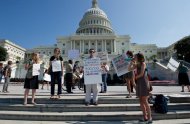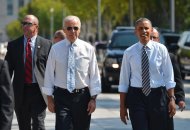
Pentagon orders civilians back to work despite shutdown
The Pentagon said Saturday it will recall most of its
furloughed employees as a US government shutdown went into its fifth day
with no signs of an end to the impasse.
President Barack Obama used his weekly radio address to demand that
Republican lawmakers "end this farce" and approve a budget to keep the
government running.But Republican leaders charged it was the president's refusal to negotiate that was to blame for the continuing stalemate.
With public discontent building, the House of Representatives voted 407 to 0 to pass a measure to retroactively pay the hundreds of thousands of federal workers forced to stay home during the crisis.
And US Defense Secretary Chuck Hagel announced that most of the estimated 400,000 furloughed Pentagon employees will be called back to work next week.
"It's very good news," rejoiced Republican Senator John Thune.
"I think that was what most of us intended when we moved that military pay bill, was that it applied not just to people who were directly members of the services but also people who were employed by them to carry out important functions and missions."
Hagel said Pentagon lawyers had concluded the law allows employees "whose responsibilities contribute to the morale, well-being, capabilities and readiness of service members" to be exempted from the shutdown.
"I expect us to be able to significantly reduce -- but not eliminate -- civilian furloughs under this process," he said.
The moves reflected deepening concern over the impact of the first federal government shutdown in 17 years, but both sides continued to point fingers at each other.
"Take that vote. Stop this farce. End this shutdown now," Obama exhorted the Republican-controlled House in his weekly radio and video address.
Eric Cantor, the number two Republican in the House, said the impasse could be worked out but Obama "seems to be unwilling to sit down and talk with us."
"It doesn't make any sense if the president has an ax to grind with the opposing party, why he would want to put the American people in the middle of that," he said.
Still, with no compromise in sight and aides on both sides saying no backroom negotiations were taking place, there were growing fears of a protracted crisis as a budget battle focused on Obama's health care law merges with a related, and potentially more damaging, fight over raising the US debt ceiling.
Obama is refusing to negotiate with Republicans over the budget issues until they pass a temporary bill to reopen the government and agree to raise the $16.7 trillion US statutory borrowing limit -- without which Washington could default on its debts for the first time ever starting on October 17.
"For as reckless as a government shutdown is, an economic shutdown that comes with default would be dramatically worse," Obama said.
The US government closed all but its essential operations Tuesday when Republican lawmakers refused to approve money for government operations without first delaying or defunding the new health care law, commonly known as Obamacare.
The US Senate has already approved a budget, and "there are enough Republican and Democratic votes in the House of Representatives willing to do the same, and end this shutdown immediately," Obama said.
"But the far right of the Republican Party won’t let Speaker John Boehner give that bill a yes-or-no vote."
Obama said he "won't pay a ransom in exchange for reopening the government. And I certainly won't pay a ransom in exchange for raising the debt ceiling."
But some Republican pragmatists who have signaled they would vote to pass a fresh spending bill worried that such a resolution was no longer achievable.
Secretary of State John Kerry, traveling in Indonesia, warned that the "reckless" political standoff threatened to weaken the US standing abroad.
"If it were prolonged, or repeated, people would begin to question the willingness of the United States to stay the course and its ability to," Kerry told reporters at the Asia-Pacific Economic Cooperation forum on the Indonesian island of Bali.
"But that's not the case and I don't think it will be the case."
Obama had been due to travel to Bali for an APEC leaders' summit starting Monday, but canceled the trip -- which would also have taken him to Brunei, Malaysia and the Philippines -- to deal with the government shutdown.
Kerry insisted that Obama's so-called strategic pivot to the Asia-Pacific had not been weakened by the president canceling his trip.
No comments:
Post a Comment